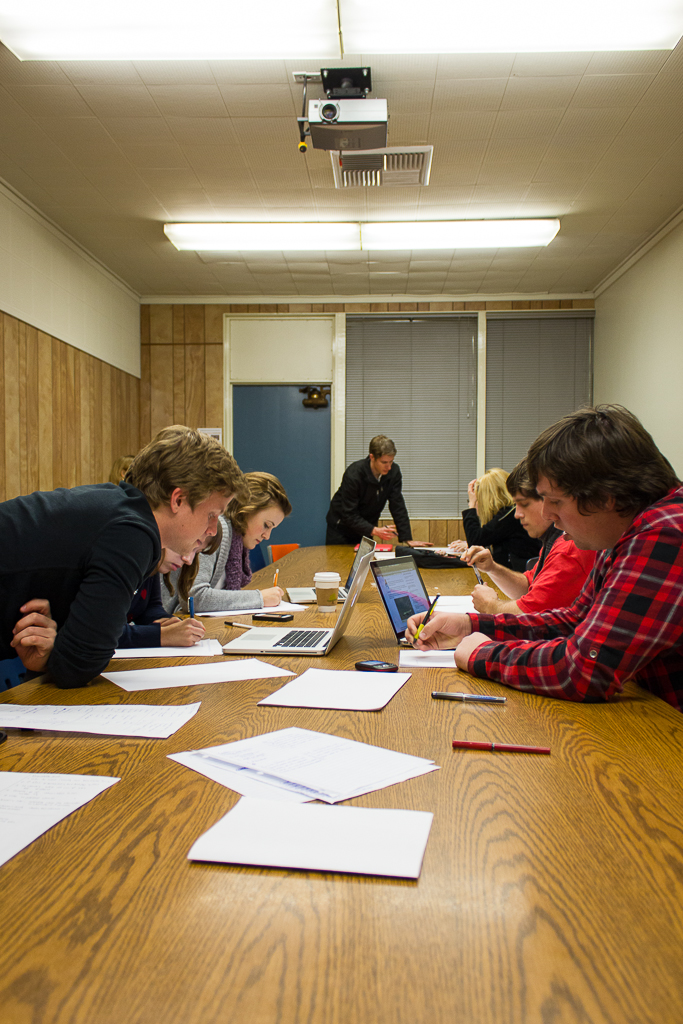The Biola forensics team won second place overall for both speech and debate events, and the debaters took first place in their division at the 2012 National Christian College Forensics Invitational in Tennessee last March. While the team has done well against other Christian schools, Biola and schools like it commonly compete with non-Christians as well, like this month’s tournaments at Point Loma Nazarene University and California State University, Long Beach.
“We will argue it is if we believe it”
At forensics debate tournaments, there are no conservative and liberal queues, no sign-up sheets for letting the judges know you are on the affirmative or negative side, no “bring your favorite issue” days. For some debates, you have months to prepare, for others, minutes. The catch is that you can’t specialize on one side. Sometimes you champion a resolution and sometimes you defy it.
“We may actually as a believer disagree with what we are arguing for,” said Daniel Elliott, a Biola alumnus, communication studies professor and the director of Biola Forensics. “But we still want to know what the other side thinks and believes and why they espouse what they do. So we will argue it as if we believe it, in order to best understand and interact with opposing points of view.”
How then, in a competition requiring versatility, do the Biola forensics team debaters achieve sincerity?
While Biolan debaters can practice sincerity by simply doing their best to argue against their better judgments, those interviewed also expressed a desire to understand what others really believe. Biola debaters recognize conviction like their own in agile debaters who can be either non-Christians or former Christians, wrote Scott Alford, a senior communications major and the team’s debate captain, in an email.
“The reality is that we compete against individuals who do no[t] share our worldview, but beyond that, are also trained in arguments and rational thought which means that they know quite well why they don’t believe in God,” Alford wrote. “Being a Christian is not something you get handed on a silver platter in this community.”
Utilizing creative arguments
In a couple of stories, Sean Hansen, a junior majoring in communication studies and a senior debater, talked about making sincere arguments in creative ways.
For example, in a parliamentary debate last year at the Christian Nationals, Hansen and his partner Scott Alford had to affirm a resolution saying, “This house would ‘like’ Kony 2012” — referring to the page on Facebook. In forensics terms, they were the “government” team, and they could choose which government to pose as. Though they considered being the U.S. government, they ended up throwing a wrench in the works.
“But then we realized that neither of us really actually agreed with the Facebook movement, because in our opinion it actually distracted from real social change,” Hansen said. “So what my partner and I decided to do is we defined ‘this house’ as the Lord’s Resistance Army, as the LRA, so we had the LRA like the Kony 2012 Facebook page, as a statement of irony.”
Alford explained how this kind of twist is just fine in forensics.
There are not very many rules beyond logistical issues, Alford wrote, and the rules that do exist are debatable.
“You can argue what you can justify,” he wrote.
Alford and Hansen won the round. At that tournament, the 2012 Christian Nationals, Biola took the top spot in their debate division. This March they will be going to the Invitational again, this time at John Brown University in Arkansas.
“Subtle opportunities” to discuss faith
It is not common for forensics competitors from Biola or other Christian schools to be open about their beliefs when speaking in competition, according to Elliott.
“That would be perceived by the secular community as Bible-thumping,” he said. “That would not go over well. But we do have subtle opportunities.”
Hansen emphasized non-competitive time with peers.
“Most of the witnessing for our faith comes outside of debate rounds,” he said.







